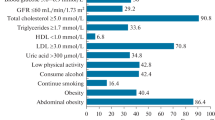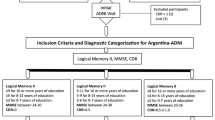Abstract
This study examines the impact of overall health status and common chronic medical conditions on cognitive performance in an older population and the effect of poor cognitive performance on functional disability. The study population consisted of 485 subjects who were 77 and 78 years old, and residing in district No. 6 of the city of Florence; all participants underwent a structured interview to collect information on demographics, education, physical health, disability, and cognitive status. Data from 94 subjects, who were previouslydiagnosed as affected by dementia or other conditions known to be direct causes of cognitive impairment, and from 6 subjects, who scored less than 20 in the Mini-Mental State Examination, were excluded from the analysis. The number of chronic conditions, drugs used, contacts with the physician, days in bed, and days of hospitalization in the last 6 months were considered as indicators of physical health. Functional disability was assessed evaluating both ADLs and IADLs. The Mini-Mental State and the “Blocks” test, a component of the Wechsler Adult Intelligence Scale Revised, were used for the assessment of cognitive status. After adjusting for the level of formal education, physical health status and several specific chronic conditions were predictors of cognitive performance. A significant association was found between a low “Blocks” test score and a decreased level of functional status. In a multivariate model, better performance on the “Blocks” test was associated with a higher score in the disability scale. This association was independent of the effect of education. The results suggest that in the elderly, poor health status is associated with a cognitive impairment that can be measured by the “Blocks” test. However, the role of this association in the pathway from disease to disability remains unclear. (Aging Clin. Exp. Res. 5: 435–443, 1993)
Similar content being viewed by others
References
Gurland B.J., Cole L.J., Cross P.S., Toner J.A.: Assessment of cognitive function in the elderly. Clin. Geriatr. Med. 3: 53–63, 1987.
Caltagirone C., Gainotti G., Masullo C., Miceli G.: Validity of some neuropsychologic tests in the assessment of mental deterioration. Acta Psychiatr. Scand. 60: 50–56, 1979.
Estwood M.R., Lautenschlager E., Corbin S.: A comparison of clinical methods for assessing dementia. JAGS 31: 342–347, 1973.
Field D., Schaie K.W., Leino E.V.: Continuity in intellectual functioning: the role of self-reported health. Psychol. Aging 4: 385–392, 1988.
Manton K.G., Siegler I.G., Woodbury M.A.: Patterns of intellectual development in later life. J. Gerontol. 41: 486–499, 1986.
Perlmutter M., Nyquist L.: Relationship between self-reported physical and mental health and intelligence performance across adulthood. J. Gerontol. 45: P145–P155, 1990.
Schaie K.W., Hertzog C.: Toward a comprehensive model of adult intellectual development: contributions of the Seattle longitudinal study. In: Sterngerg R.J. (Ed.), Advances in human intelligence, Vol. 3. Erlbaum, Hillsdale, New Jersey, 1986, pp. 79–118.
Salthouse T.A.: A theory of cognitive aging. North Holland, Amsterdam, 1986.
Perlmutter M.: Cognitive potential throughout life. In: Birren J.E., Bengtson V. (Eds.), Emergent theories on aging. Springer, New York, 1988, pp. 247–268.
Kovar M.G., Hendershot G., Matis E.: Older people in Unites States who receive help with basic activities of daily living. AJHA 79: 778–779, 1989.
Hermanova H.: Multidisciplinary health assessment of the elderly. An international perspective. Dan. Med. Bull. 7: 4–6, 1989.
Cornoni-Huntley J., Brock D.B., Ostfeld A.M., Taylor J.O., Wallace R.B., Lafferty M.E.: Established Population for Epidemiologic Studies of the Elderly. Resource data book. National Institute on Aging. Washington, D.C., NIH Pub. No. 86–2443, 1986.
Colvez A., Blanchet M.: Disability trends in the Unites States Population 1966–76: Analysis of reported causes. Am. J. Public Health 71: 464–471, 1981.
Ford A.B., Folmar S.J., Salmon R.B., Medalie J.H., Roy A.W., Galazka S.S.: Health and function in the old and very old. JAGS 36: 187–197, 1988.
Ferrucci L., Guralnik J.M., Baroni A., Tesi G., Antonini E., Marchionni N.: Value of combined assessment of physical health and functional status to determine prognosis in aged people living in the community: A prospective study in Florence, Italy. J. Gerontol. 46: M52–M56, 1991.
Folstein M.F., Folstein S.E., McHugh P.R.: Mini Mental State. A practical method for grading the cognitive state of patients for clinicians. J. Psychiatr. Res. 12: 189–198, 1975.
Heikkinen E., Waters W.E., Brzezinski Z.J.: The elderly in eleven countries. A sociomedical survey. Copenhagen, WHO, 1983.
Brayne C., Calloway P.: The association of education and socioeconomic status with the Mini Mental State Examination and the clinical diagnosis of dementia in elderly people. Age Ageing 19: 91–96, 1990.
Kittner S.J., White L.R., Farmer M.E.: Methodological issues in screening for dementia: the problem of education adjustment. J. Chronic Dis. 39: 163–170, 1986.
Avorn J.: Biomedical and social determinants of cognitive impairment in the elderly. JAGS 31: 137–143, 1983.
Palmore E.B., Nowlin J.B., Wang H.S.: Predictors of function among the old-old. A ten-year follow-up. J. Gerontol. 40: 244–250, 1985.
Haugh M.R., Breslau N.: Selective survival and social factors in elderly mental health. The Gerontologist 27: 68A, 1987.
Pinsky J.L., Leaverton P.E., Stokes J.: Predictors of good function: The Framingham Study. J. Chronic Dis. 40 (Suppl.): S159–S167, 1987.
Tesi G., Antonini E., Ferrucci L., Maggino F., Baroni A.: La misura della autosufficienza nella popolazione anziana. Giorn. Gerontol. 38: 381–385, 1990.
Horn J.L., McHardle J.: In: Poon L.W. (Ed.), Handbook for clinical memory assessment of older adults. American Psychological Association, Washington, D.C., 1986, pp. 20–44.
Wechsler D.: Wechsler Adult Intelligence Scale Revised (WAIS-R). Psychological Corporation, New York, 1981.
Brink T.L., Yesavage J.A., Lun O., Hevesuma P.H., Adey M., Rose T.L.: Screening test for geriatric depression. Clin. Gerontol. 1: 37–44, 1982.
Arenberg D., Robertson-Tchabo E.A.: Learning and aging. In: Birren J.E., Schaie K.W. (Eds.), Handbook of the psychology of aging. Van Nostrand Reinhold, New York, 1977, pp. 421–449.
Botwinick J.: Intellectual abilities. In: Birren J.E., Schaie K.W. (Eds.), Handbook of the psychology of aging. Van Nostrand Reinhold, New York, 1977, pp. 384–420.
Laubovie-Vief G.: Intelligence and cognition. In: Birren J.E., Schaie K.W. (Eds.), Handbook of the psychology of aging. Van Nostrand Reinhold, New York, 1977, pp. 500–530.
Perlmutter M.: A life span view of memory. In: Baltes P.B., Featherman D.L., Lerner R.M. (Eds.), Life span development and behavior. Erlbaum, Hillsdale, New Jersey, 1993, pp. 272–308.
Merril F.E., Robbins M.A., Schultz N.R., Pierce T.W.: Is blood pressure an important variable in research of aging and neuropsychological test performance? J. Gerontol. 45: P128–P135, 1993.
Senility reconsidered. Treatment possibilities for mental impairment in the elderly. Task force sponsored by the National Institute on Aging. JAMA 244: 259–263, 1980.
DeVries H.A.: Physiologic effects of an exercise training regimen upon men aged 52 to 88. J. Gerontol, 25: 325–331, 1970.
Spirduso W.W.: Physical fitness, aging and psychomotor speed: a review. J. Gerontol. 35: 383–389, 1980.
Molloy D.W., Beerschoten D.A., Borrie M.J., Crilly R.G., Cape R.D.T.: Acute effects of exercise on neuropsychological function in elderly subjects. JAGS 36: 29–33, 1988.
Solomon D.: National Institute of Health consensus development conference statement: geriatric assessment method for clinical decision making. JAGS 36: 342–347, 1988.
Willis S.L., Schaie K.W.: Practical intelligence in later adulthood. In: Sternberg R., Wagner R. (Eds.), Practical intelligence. Cambridge University Press, New York, 1986, pp. 236–270.
Hennekens C.K., Buring J.E.: Epidemiology in Medicine. Little, Brown and Company, Boston, 1987.
Katz S., Downs T.D., Cash H.R., Grotz H.R.: Progress in development of the index of ADL. Gerontologist 1: 20–30, 1970.
Fried L.P., Bush T.L.: Morbidity as a focus of preventive health care in the elderly. Epidemiol. Rev. 10: 48–64, 1988.
Author information
Authors and Affiliations
Additional information
This work was partially completed when Dr. Ferrucci was Visiting Associate in the Epidemiology, Demography and Biometry Program at the National Institute on Aging.
Rights and permissions
About this article
Cite this article
Ferrucci, L., Guralnik, J.M., Marchionni, N. et al. Relationship between health status, fluid intelligence and disability in a non demented elderly population. Aging Clin Exp Res 5, 435–443 (1993). https://doi.org/10.1007/BF03324198
Received:
Accepted:
Published:
Issue Date:
DOI: https://doi.org/10.1007/BF03324198




